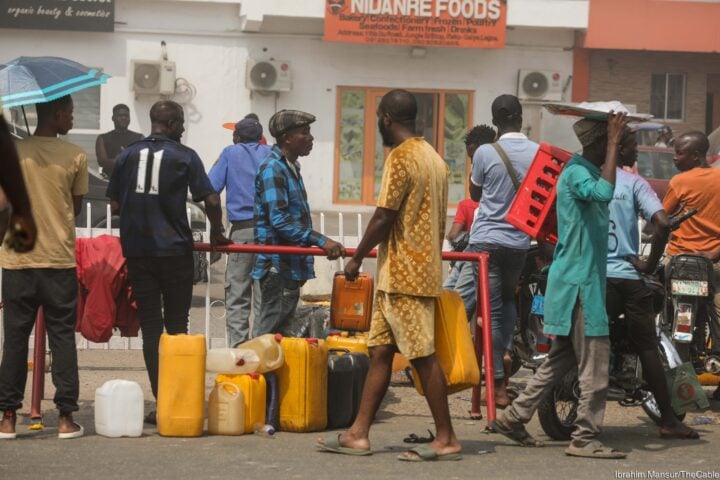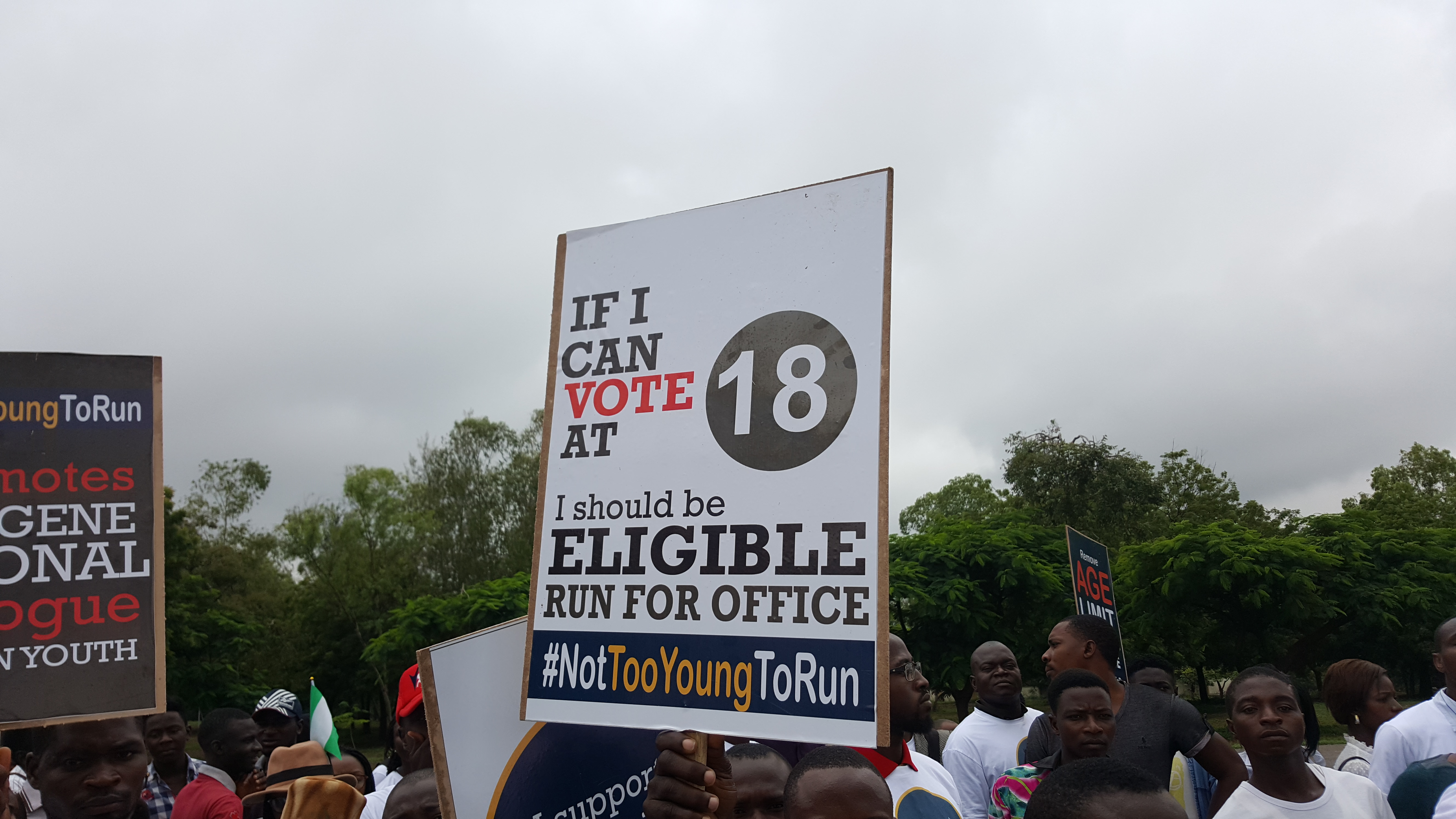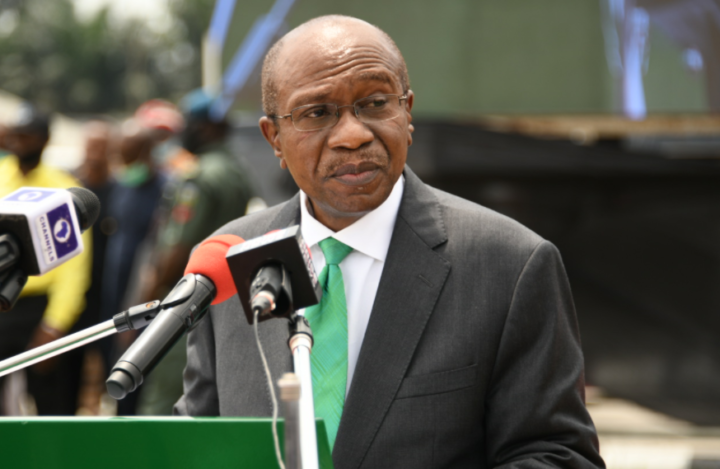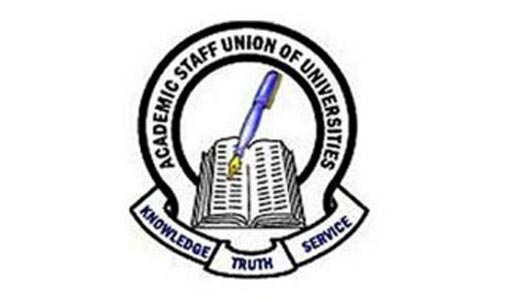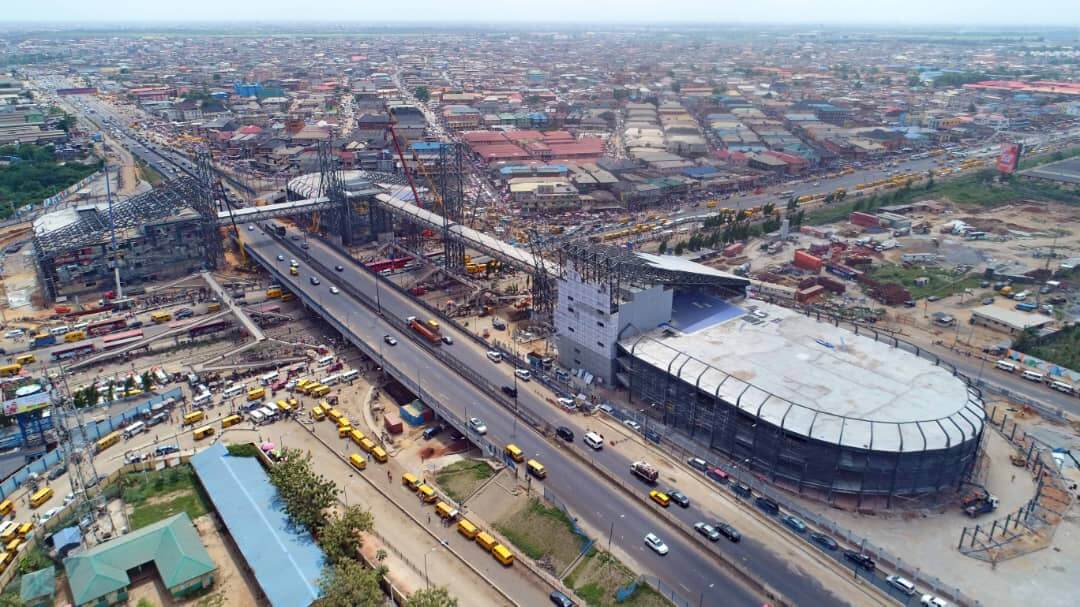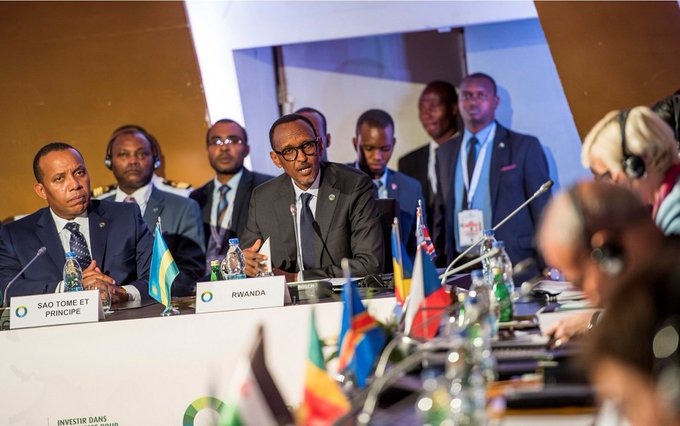For the last two weeks, I have not only been going and coming back from work at an increased transport fare, but I have witnessed many fights caused by the ongoing fuel scarcity. I have witnessed violent fights between conductors and passengers or drivers and passengers over the increased fare, where passengers entered the vehicle with the knowledge of the new fare and then tried to pay the old fare when they got to their destination. The passengers cannot be blamed. The route that I ply for N150 is now N250, and once while coming back from work recently, I had to pay N300.
I’ve seen people on the side of the streets fight bitterly over kegs of fuel. I’ve seen private and commercial drivers get into fistfights with fuel station workers. I’ve seen people on snake-long queues fight each other fiercely over their positions on the fuel queue. This violence is almost becoming a constant part of my workday as Nigerians have started showing each other their ‘craze’. While witnessing these fights, what kept popping up in my mind is what if we directed this ‘craze’ at those behind this fuel scarcity?
In fact, the government that is behind this fuel scarcity are afraid of our ‘craze’ and that’s why they are trying to throw the blame on different sections of the government. The federal government led by the self-appointed minister of petroleum resources, President Buhari, is blaming the Nigerian National Petroleum Corporation (NNPC). The NNPC is blaming oil importers and marketers. Those ones are returning the blame to NNPC, and it goes on and on. The fact still remains that anyone that could be blamed for this fuel scarcity is either part of this federal government or regulated by this federal government.
The same Nigerians that were able to push back the federal government on the removal of fuel subsidy and the increment to N320 that would follow are presently buying fuel at about N1,000 on the black market here in Abuja. Seeing that this artificial scarcity is starting to serve the purpose of the government to increase fuel price, it is therefore valid that Nigerians are starting to suspect that the FG is just using this artificial scarcity to bring in fuel price increment through the backdoor while excusing the scarcity on bad fuel. It might be easy to discard this theory of most Nigerians as a conspiracy theory, but the scientific approach to a theory is not to discard it but to test it rationally.
Advertisement
Now, the hypothesis is that ‘the FG wants to use the excuse of bad fuel to create this artificial scarcity to increase fuel price’. To prove that in this court of public opinion, I’ll mimic the manner in which such theories are proven in the court of law.
The legal system has a structure in place for testing these kinds of theories and I’d like to employ that.
The first element to consider is the existence of a criminal intent in the mental state of the criminal, which is sometimes called the Mens Rea (guilty mind). This element of the test will test whether the FG had any intention to commit this political crime of fuel price increment or whether it was just an unintentional result of the bad fuel. According to the evidence before us, the federal government was so intent on increasing fuel price this time around that it was part of the petroleum industry bill that was passed into law since August last year and was supposed to take effect by February (the month of the artificial fuel scarcity). The plan was foiled when the organised labour called for mass rallies to oppose the subsidy removal and increment in fuel price, and the FG called off the subsidy removal late in January because they feared a mass revolt in proportions greater than #EndSARS according to news reports. The criminal intent to commit this political crime against the masses of fuel price increment is therefore ascertained as present, my Lordships.
Advertisement
The next element to consider is the existence of a criminal act or the criminal omission of an act, which is sometimes called the Actus Rea (guilty 1act). This element of the test will test whether the FG actually committed this political crime of fuel increment directly by commission (or mission), or indirectly by omission. There is no evidence before us that the federal government committed the political crime of fuel increment by commission (or mission), but there is surplus evidence before this court that the FG committed this crime by omission. The FG blamed the NNPC and the Standards Organisation of Nigeria when the issue of bad fuel broke. The blame for the bad fuel was quickly placed on four oil trading companies by the NNPC immediately after the issue happened. The blame was returned to NNPC and its own oil trading company, Duke oil, by the other oil trading companies. Some analysts have also blamed fuel stations for only selling to black-market retailers, and some have even blamed black market retailers trying to cash in on the crises and aiding price increment.
The SON and the NNPC are under the control of the federal government through the ministry of petroleum resources led by President Muhammadu Buhari, the sitting president of Nigeria. The oil trading companies are under the regulation of the NNPC. The fuel marketers and fuel stations are under the control of the Nigerian Midstream and Downstream Petroleum Regulatory Authority (NMDPRA). The Petroleum Equalisation Fund (Management) Board, Department of Petroleum Resources (DPR), and Petroleum Products Pricing Regulatory Agency (PPPRA) are now under the NMDPRA according to the petroleum industry act. These are all supposed to be under the control of the federal government, but the PIA made the NNPC into an incorporated company, incorporated by the Corporate Affairs Commission as of September last year. Some analysts might argue that this incorporation makes the bad fuel total blame of the NNPC and not of the government. But who signed the PIA into law as of August last year? The same Buhari-led federal government!
Also, despite the NNPC becoming NNPC Limited, it is still under the regulation of the FG. Whichever way we want to look at it, the federal government committed this political crime of fuel price increment by omission. It is the job of the FG to ensure this does not happen, yet it happened. Rather than advise the FG on what to do to ensure this does not happen again, we must first assert that it has happened on their watch. We should hold those we elected responsible, not even Mele Kyari of the NNPC or the oil marketers or the black market retailers. The blame is on the FG and the FG only because those are the representatives we elected, and are supposed to have power over. Now my Lordships, we have ascertained that this politically criminal act was actually committed by omission by the FG.
Now that we have proven the concurrence of Mens Rea and Actus Rea, the last element to examine to test our theory will then be causation. Would this political crime of fuel price happen without the participation of the Buhari-led FG and its policies? No! It wouldn’t have happened! It is this government that has refused to make modular refineries work despite all the funds spent on turnaround maintenance. It is this government that has refused to build public refineries manged by the people but have committed public funds to the Dangote refinery. It is this government that used their intolerance of local public refineries to create a situation where we would have to import the fuel that are mined in our own country. It is this government that passed the PIB into law last year making it harder to regulate the distribution of petroleum products by the government. It is this government and their policies that have caused this artificial scarcity of fuel, artificial fuel price increment and the importation of bad fuel that was excused as the cause. Without the neo-liberal policies of the Buhari-led FG, we won’t have the need to import fuel, or bad fuel in this case.
Advertisement
Now my Lordships in this court of public opinion, we have proven beyond reasonable doubt that the Buhari-led federal government is the culprit in this political crime of artificial fuel scarcity and artificial fuel price increment. But then there are some extra points!
Does the federal government have an antecedence of backdoor fuel increments after such increment has been rejected through the front door? Yes!
In 2016, when the official fuel price was N86.5 and the Buhari government wanted to increase prices, it was an artificial scarcity like this that was witnessed in places like Kano, Sokoto, Kaduna, Katsina, etc. Then the artificial black market price was spiked to between N220 and N230 to force an increment to N145 while blaming fuel marketers, as usual.
Is the federal government committing the same crime presently in another sector? Yes!
Advertisement
The electricity tariff that was part of what Nigerians stood up against when organised labour was planning rallies last month have already been increased through the backdoor. Within this month, the Nigerian Electricity Regulatory Commission (NERC) raised the tariff for electricity consumers of Abuja and Port Harcourt distribution companies by N4 per unit. This was increased without public notice and confirmed by consumers who said that N5,000 now buys N91.7 units instead of the usual 107 units according to news reports.
In a February 8, 2018 statement, the NNPC said the country’s daily petrol consumption was around 35 million litres. Is it not suspicious that despite the methanol contamination of the dirty fuel just happening to 170.25million litres of fuel (volume of fuel to be consumed for 5.12 days) the fuel scarcity has lasted over two weeks?
Advertisement
Is it not suspicious that despite the assurances from the NNPC and the Nigerian Midstream and Downstream Petroleum Regulatory Authority (NMDPRA) to restore normalcy in the supply and distribution of good quality fuel by the first weekend of the scarcity and end the scarcity that weekend, the fuel scarcity is about to enter the third week? Are we still conspiracy theorists after all these extra points too?
It is time for Nigerians to struggle against fuel price increment through the backdoor of artificial fuel scarcity. People can’t go to work or be productive anymore because of this increment. The population queueing up and wasting a whole day at fuel stations will be enough to start mass protests across major cities of the country and get immediate results from those we elected to handle these things. It’s a bad fight to spend the energy we should use for that fight turning on one another. I charge us all to rise and fight paraphrasing the words of Apostle Paul in his letter to the young church leader, Timothy, by saying: “Fight the good fight of fuel ’til you lay hold on your full tank”.
Advertisement
Omole Ibukun writes from Abuja, Nigeria and can be contacted on 09060277591
Advertisement
Views expressed by contributors are strictly personal and not of TheCable.
Add a comment
